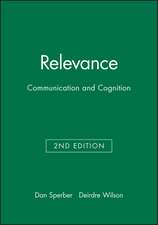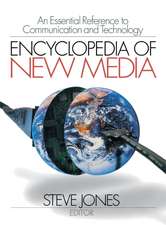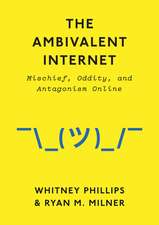Privacy and the Media
Autor Andrew McStayen Limba Engleză Paperback – 5 apr 2017
Privacy and the Media equips students to do just that, providing a comprehensive overview of both the theory and reality of privacy and the media in the 21st Century. Offering a rich overview of this crucial and topical relationship, Andy McStay:
- Explores the foundational topics of journalism, the Snowden leaks, and encryption by companies such as Apple
- Considers commercial applications including behavioural advertising, big data, algorithms, and the role of platforms such as Google and Facebook
- Introduces the role of the body with discussions of emotion, wearable media, peer-based privacy, and sexting
- Encourages students to put their understanding to work with suggestions for further research, challenging them to explore how privacy functions in practice.
'Privacy and the Media is a thoughtful survey of the privacy landscape. McStay reviews the intricate tensions and seeming contradictions to offer an accessible book for anyone curious about the contemporary debates in privacy.'
- danah boyd, author of It’s Complicated and founder of Data & Society
‘McStay’s great achievement here is to confront many of the pertinent and complex questions about media and privacy in a style that is both authoritative and easy to read... His book will prove an excellent companion for all students of this fascinating and crucial topic.’
- Mireille Hildebrandt, Vrije Universiteit Brussel
‘Clearly and accessibly written, this book is a great resource for anyone interested in the broad range of ways in which privacy and contemporary media are entangled and in the big picture of privacy/media relations today... I will definitely be assigning it for my students.’
- Helen Kennedy, University of Sheffield
| Toate formatele și edițiile | Preț | Express |
|---|---|---|
| Paperback (1) | 354.62 lei 6-8 săpt. | |
| SAGE Publications – 5 apr 2017 | 354.62 lei 6-8 săpt. | |
| Hardback (1) | 829.16 lei 6-8 săpt. | |
| SAGE Publications – 5 apr 2017 | 829.16 lei 6-8 săpt. |
Preț: 354.62 lei
Nou
Puncte Express: 532
Preț estimativ în valută:
67.88€ • 73.76$ • 57.05£
67.88€ • 73.76$ • 57.05£
Carte tipărită la comandă
Livrare economică 21 aprilie-05 mai
Preluare comenzi: 021 569.72.76
Specificații
ISBN-13: 9781473924932
ISBN-10: 1473924936
Pagini: 224
Dimensiuni: 170 x 242 x 16 mm
Greutate: 0.41 kg
Ediția:First Edition
Editura: SAGE Publications
Colecția Sage Publications Ltd
Locul publicării:London, United Kingdom
ISBN-10: 1473924936
Pagini: 224
Dimensiuni: 170 x 242 x 16 mm
Greutate: 0.41 kg
Ediția:First Edition
Editura: SAGE Publications
Colecția Sage Publications Ltd
Locul publicării:London, United Kingdom
Recenzii
Privacy and the Media is a thoughtful survey of the privacy landscape. McStay reviews the intricate tensions and seeming contradictions to offer an accessible book for anyone curious about the contemporary debates in privacy.
This pleasingly accessible book tackles all the major questions that arise in a world whose lifeblood is our personal information; liberty, choice, transparency, control. It goes to the “conceptual, ethical and legal heart of privacy”. McStay argues that privacy is “not about isolation, going off-grid or being a digital hermit”. Rather, it is about managing our online lives and controlling how much others know about us. This book persuades me more than ever that privacy is a branch of ethics – the age-old relationship between the self and the other.
Privacy and the Media’ is not a set of neatly answered questions or defences of established positons. It is a series of embarkation points for further exploration of an increasingly critical area of study, with real-world implications for the nature of our ‘datafied’ selves.
The book will serve as a great introduction to informational privacy, not just for media studies students and privacy lawyers, but for any information rights professional needing a deeper understanding of the subject.
McStay’s great achievement here is to confront many of the pertinent and complex questions about media and privacy in a style that is both authoritative and easy to read. He provides an excellent overview of the perennial debates and considers the implications on privacy of an increasingly data-driven media environment. His book will prove an excellent companion for all students of this fascinating and crucial topic.
The only book that addresses the full spectrum of the innovation-privacy dynamic, ranging from advertising to intelligence to wearables. It is both timely and necessary; essential reading.
Clearly and accessibly written, this book is a great resource for anyone interested in the broad range of ways in which privacy and contemporary media are entangled and in the big picture of privacy/media relations today. It challenges media studies to take privacy seriously as a media – and a mediation – issue. I will definitely be assigning it for my students.
This pleasingly accessible book tackles all the major questions that arise in a world whose lifeblood is our personal information; liberty, choice, transparency, control. It goes to the “conceptual, ethical and legal heart of privacy”. McStay argues that privacy is “not about isolation, going off-grid or being a digital hermit”. Rather, it is about managing our online lives and controlling how much others know about us. This book persuades me more than ever that privacy is a branch of ethics – the age-old relationship between the self and the other.
Privacy and the Media’ is not a set of neatly answered questions or defences of established positons. It is a series of embarkation points for further exploration of an increasingly critical area of study, with real-world implications for the nature of our ‘datafied’ selves.
The book will serve as a great introduction to informational privacy, not just for media studies students and privacy lawyers, but for any information rights professional needing a deeper understanding of the subject.
McStay’s great achievement here is to confront many of the pertinent and complex questions about media and privacy in a style that is both authoritative and easy to read. He provides an excellent overview of the perennial debates and considers the implications on privacy of an increasingly data-driven media environment. His book will prove an excellent companion for all students of this fascinating and crucial topic.
The only book that addresses the full spectrum of the innovation-privacy dynamic, ranging from advertising to intelligence to wearables. It is both timely and necessary; essential reading.
Clearly and accessibly written, this book is a great resource for anyone interested in the broad range of ways in which privacy and contemporary media are entangled and in the big picture of privacy/media relations today. It challenges media studies to take privacy seriously as a media – and a mediation – issue. I will definitely be assigning it for my students.
Cuprins
1. Introduction
PART I: Journalism, Surveillance and Politics of Encryption
2. Nothing to hide, nothing to fear: myth and Western roots of privacy
3. Journalism: a complex relationship with privacy
4. The Snowden leaks: a call for better surveillance
5. Encryption: simultaneously public and private
PART II: Commercial dimensions of privacy and media
7. Behavioural and programmatic advertising: consent, data alienation and problems with Marx
8. The right to be forgotten: memory, deletion and expression
9. Big data: machine learning and the politics of algorithms
PART III: The role of the body
10. Empathic media: towards ubiquitous emotional intelligence
11. Re-introducing the Body: intimate and wearable media
12. Being young and social: inter-personal privacy and debunking seclusion
13. Sexting: exposure, protocol and collective privacy
14. Conclusion: what do media developments tell us about privacy?
PART I: Journalism, Surveillance and Politics of Encryption
2. Nothing to hide, nothing to fear: myth and Western roots of privacy
3. Journalism: a complex relationship with privacy
4. The Snowden leaks: a call for better surveillance
5. Encryption: simultaneously public and private
PART II: Commercial dimensions of privacy and media
7. Behavioural and programmatic advertising: consent, data alienation and problems with Marx
8. The right to be forgotten: memory, deletion and expression
9. Big data: machine learning and the politics of algorithms
PART III: The role of the body
10. Empathic media: towards ubiquitous emotional intelligence
11. Re-introducing the Body: intimate and wearable media
12. Being young and social: inter-personal privacy and debunking seclusion
13. Sexting: exposure, protocol and collective privacy
14. Conclusion: what do media developments tell us about privacy?
Notă biografică
Andrew McStay is Professor of Digital Life at Bangor University, UK. His most recent book, Emotional AI: The Rise of Empathic Media, examines the impact of technologies that make use of data about affective and emotional life. Current projects include study of emotional AI, children and parents, and (separately) cross-cultural analysis of emotional AI in UK and Japan. Non-academic work includes IEEE membership (P7000/7014) and ongoing advising roles for start-ups, NGOs and policy bodies. He has also appeared and made submissions to the United Nations Office of the High Commissioner on the right to privacy in the digital age, the UK House of Lords AI Inquiry and the UK Department for Culture, Media and Sport Inquiry on fake news and reality media.
Descriere
Providing a comprehensive overview of both the theory and reality of privacy and the media in the 21st Century, Privacy and the Media is not a polemic on privacy as ‘good’ or ‘bad’, but a call to assess the detail and the potential implications of contemporary media technologies and practices.











